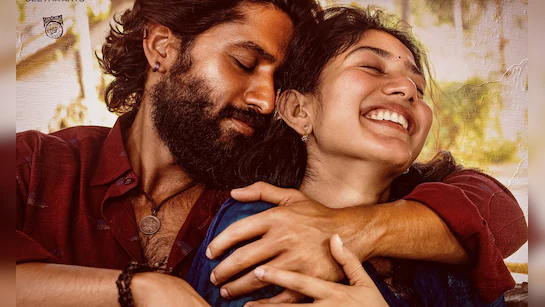The actors are good together, but the screenplay keeps playing spoilsport. What could have been a deeply resonant romance ends up being a shallow test of your patience.The rest of this review contains spoilers.
Thandel is based on the real-life story of fishermen who drifted into Pakistani waters and were detained for a long time until they were released. But the first image of the movie is that of a sad woman on a seat in a railway platform. She is Sathya, and she has just said goodbye to the man she loves, Raju. (Sai Pallavi and Naga Chaitanya play Sathya and Raju). He is a fisherman in this small coastal village in Andhra Pradesh, and their usual goodbyes are when Raju and his fellow-fishermen set out to Gujarat for months at a time to catch fish. But this time, the goodbye is more permanent. At that point in this railway station, Sathya has decided that she cannot wait for Raju for the many months he is gone. And given that it’s the sea, there isn’t even a signal that can facilitate phone contact.
So we begin to think this is a love story – and in theory, it’s a damn good love story. Raju and Sathya are madly in love. You probably sensed this in the poster that had the two embracing. It felt like they had been glued together. For a while, we see that Sathya has made her peace with Raju’s profession, whose nature results in the fact that they are separated for months. Because this is a fishing community, this separation is what all women have to endure. But when a boat capsizes and the dead fishermen are brought back to the village, Sathya begins to think that this could happen with Raju, too. Long-distance relationships are already complicated, but here, we have a long-distance non-relationship that exists only on faith that the other person is still alive. Sathya wants Raju to stop going to sea, but he can’t do that. She breaks up with him.

These parts of the story (as indeed the whole movie) needed much better writing, but Sathya’s increasing paranoia and Raju’s casual refusal to see this as a serious issue allow Sai Pallavi and Naga Chaitanya to do some very good work. The love scenes needed to dig deeper and give us a sense of Sathya and Raju as more than just broad-strokes characters, but the actors share good chemistry and – to the extent that they can – they fill in the gaps in the writing. Devi Sri Prasad announces his lovely solo violin theme right on top, during the opening credits, and it keeps returning. Yes, there is too much music – but again, the lush score helps to evoke feelings that aren’t fleshed out in the screenplay.
The fundamental problem in Thandel is twofold. One, director Chandoo Mondeti cannot decide if he is making a soft, sensitive love story or a hard, macho action movie. The film seems divided in intention. Sathya’s character, at least, stays within the confines of the love story. Everything she does has to do with her feelings towards Raju. But perhaps with an eye on the larger audience, Raju is shaped as a mass hero. He is introduced with an action scene. Then, there’s another action scene when some goons decide to take over the fishing community’s area for sand-mining. The idea is that Raju cares as much about his village as he cares for Sathya, but these portions are so over the top that they become borderline comical, especially some aerial acrobatics that Raju does over a stormy sea.
The second issue is that the director wants the understated emotions of a complicated love story as well as exaggerated outpourings of jingoism, when Raju and other fishermen end up in a prison in Pakistan. The Pakistani prisoners are portrayed as xenophobic cartoons. In a movie like Gadar, the over-the-top-ness is built into its DNA. In Thandel, the constant change in emotional temperature quickly becomes tiring. One of the more interesting aspects of the love story is that an angry Sathya agrees to marry another man. This is the most fascinating aspect of this woman, that she is desperately trying to convince herself that she can fall out of love with Raju. But the new guy (played by Karunakaran) turns out to be such a saint that any dramatic possibility there is squandered.
I kept thinking about Sekhar Kammula’s Love Story, where the same lead pair had solid romantic and professional arcs to negotiate. Every film does not have to have the same tonality, but even if you are going to be loud and massy, the emotional beats of the story – Sathya’s fight with her feelings for Raju, and Raju’s fight for his men – should register well. In the second half, except for a few moments, Raju seems to be waging a war against Pakistan and barely interested that he’s had a breakup with the love of his life. Even the ending gives us more emotion from her side than his. Sathya becomes a crusader, trying to get these men out of jail. Raju and his men have a choreographed dance in the Pakistani prison when they realise they are going to be released. Amidst all this shallowness, we never feel the big gaps of time, the periods of separation between Raju and Sathya, whether at sea or during the prison scenes. In short, we don’t feel much. The emotions in the story don’t cross over to screen, and we are left with a confused movie that wants to be everything to everyone.


